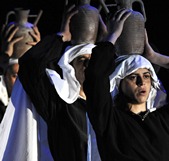SITE GUIDE
SEARCH
REVIEWS
REVIEW ARCHIVES
ADVERTISING AT CURTAINUP
FEATURES
NEWS
Etcetera and
Short Term Listings
LISTINGS
Broadway
Off-Broadway
NYC Restaurants
BOOKS and CDs
OTHER PLACES
Berkshires
London
California
New Jersey
DC
Connecticut
Philadelphia
Elsewhere
QUOTES
TKTS
PLAYWRIGHTS' ALBUMS
LETTERS TO EDITOR
FILM
LINKS
MISCELLANEOUS
Free Updates
Masthead
Writing for Us
A CurtainUp  London Review
London Review
 London Review
London ReviewI Am Yusuf And This Is My Brother
by Tim Newns
|
In two weeks you'll sail home to your Sheffield, and not once will you look back to see the mess you've made . . . — Nagi
|

Samaa Wakeem (foreground) (Photo: Keith Pattison) |
The story centres on two brothers, Ali (Ali Suliman) and Yusuf (Amer Hlehel). Ali is the elder and more street smart whereas Yusuf has clearly got a disability that we later find out the cause of. Ali is in love with Nada (Samaa Wakeem), a local village girl but her father refuses to allow them to marry on the ground that Yusuf is "odd". As the British mandate ends, the country splits in two, their town is destroyed due to the invading armies of Israel and Ali and Yusuf embark on a journey to find Nada. However, it quickly becomes clear that Yusuf is too much of a hindrance in Ali's search for his true love.
A homesick soldier called Rufus (Paul Fox) represents Britain's involvement in the story. Yearning for his hometown of Sheffield, Rufus symbolizes the frustrating neutrality and empty truths the British must have plied the Palestinian people with during this fragile time.
The love story is largely overshadowed by the major effects the British withdrawal had on the Palestinian people. Our memories and emotions are attacked as we are confronted with various poetic images and poignant moments reminding us of the desolate situation brought upon these people.
There are some genuine and remarkable performances from Amer Hlehel and Ali Suliman who play Yusuf and Ali respectively. Amer's Yusuf is full of innocence, charm and humour and appeals to our emotions throughout. A stark set consisting of mainly a large canvas sheet is imaginatively used for various locations and water is quite predominant in the production. In fact, much of the brothers' final journey is played on a large puddle, which perhaps emphasises the strenuous and exasperating situation the brothers are in.
Our feelings of sympathy and guilt are unfortunately stopped short by the production's technical faults. In a political play that is a mix of Arabic and English, it was disappointing to see that an effective translation process was not in place. Subtitles were often displayed out of time on a mix of screens and bathtubs. The words were so distanced from the action on stage and our attention was so often drawn away that it eventually became a distraction.
These faults should not, however, cloud the importance of the play from an important and impressive writer. Zuabi's company Shiber-Hur has created a piece that doesn't set out to point fingers and to blame but is a poetic reminder of the troubles his people faced and perhaps an explanation of the current war-torn lives they still face today.
|
Subscribe to our FREE email updates with a note from editor Elyse Sommer about additions to the website -- with main page hot links to the latest features posted at our numerous locations. To subscribe,
E-mail: esommer@curtainup.comesommer@curtainup.com
put SUBSCRIBE CURTAINUP EMAIL UPDATE in the subject line and your full name and email address in the body of the message -- if you can spare a minute, tell us how you came to CurtainUp and from what part of the country. |
| I Am Yusuf And This Is My Brother
Written by Amir Nizar Zuabi Directed by Amir Nizar Zuabi Starring: Ali Suliman, Amer Hlehel, Paul Fox, Salwa Nakkara, Samaa Wakeem, Taher Najib, Tarez Sliman and Yussef Abu Warda Design: Jon Bausor Lighting: Colin Grenfell Music: Habib Shehadeh Hanna Running time: One hour thirty minutes without an interval Box Office: 020 7922 2922 Booking to 6th February 2010 Reviewed by Tim Newns based on 21st January 2010 performance at Young Vic Theatre, 66 The Cut, Waterloo, London SE1 8LZ. |
|
REVIEW FEEDBACK Highlight one of the responses below and click "copy" or"CTRL+C"
Paste the highlighted text into the subject line (CTRL+ V): Feel free to add detailed comments in the body of the email . . . also the names and emails of any friends to whom you'd like us to forward a copy of this review. |
|
London Theatre Tickets Lion King Tickets Billy Elliot Tickets Mighty Boosh Tickets Mamma Mia Tickets We Will Rock You Tickets Theatre Tickets |




